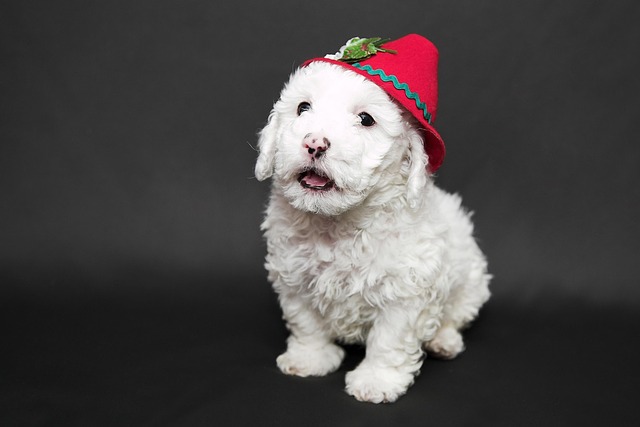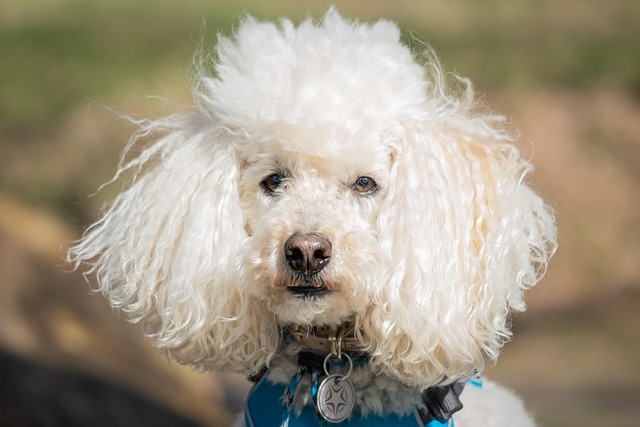When we see the cute and furry face of our dog developing an ulcer, our hearts are filled with anxiety and compassion. Dogs can't speak and tell us about their physical pain; they can only endure it silently. As their guardians, we are eager to find out what exactly causes this terrifying ulcer.
There can be multiple reasons for a dog's facial ulcer. Trauma is a relatively common factor. Dogs are naturally lively and active. When they are playing and exploring their surroundings, it's inevitable that they will have some bumps and bruises. Maybe it accidentally bumps into a sharp table corner while chasing a ball, or it gets scratched by the claws of other playmates during frolic. These seemingly insignificant small wounds, if not treated promptly and properly, are easily invaded by microorganisms such as bacteria and viruses, which can then lead to an infection and eventually cause an ulcer.
Skin diseases are also a major culprit for a dog's facial ulcer. For example, fungal skin diseases are more likely to thrive in a humid and stuffy environment. When the living environment of the dog is not dry and clean enough, or its own resistance is weakened, it is prone to fungal infections. Fungi will multiply in large numbers on the dog's skin, damaging the normal structure of the skin, causing the appearance of red patches and hair loss, and then developing into an ulcer. There are also bacterial skin diseases. Bacteria such as staphylococci and streptococci often lurk on the surface of the dog's skin. Once the skin's barrier function is damaged, they will take advantage of the situation, trigger inflammation, and cause facial ulcers. In daily pet care, regularly combing the dog's fur, giving it baths, and keeping the living environment well-ventilated and dry can effectively reduce the probability of skin diseases.
 Allergy is also a factor that cannot be ignored. Just like humans, dogs may be allergic to certain substances, such as some ingredients in food, pollen, dust mites, chemical detergents, etc. When a dog comes into contact with these allergens, its immune system will recognize them as foreign "enemies" and activate the defense mechanism, resulting in an allergic reaction on the skin. The allergic reaction may initially manifest as skin itching and redness, and the dog will not be able to resist scratching its face constantly. In this way, it is very easy to break the skin and cause an ulcer. If you suspect that your dog is allergic, you may consider taking it to a professional pet hospital for an allergen test to achieve precise prevention and control.
Allergy is also a factor that cannot be ignored. Just like humans, dogs may be allergic to certain substances, such as some ingredients in food, pollen, dust mites, chemical detergents, etc. When a dog comes into contact with these allergens, its immune system will recognize them as foreign "enemies" and activate the defense mechanism, resulting in an allergic reaction on the skin. The allergic reaction may initially manifest as skin itching and redness, and the dog will not be able to resist scratching its face constantly. In this way, it is very easy to break the skin and cause an ulcer. If you suspect that your dog is allergic, you may consider taking it to a professional pet hospital for an allergen test to achieve precise prevention and control.
Parasite infections can also put a dog's face in a difficult situation with ulcers. Parasites such as mites and fleas will parasitize on the dog's skin, suck their blood, and stimulate the skin to produce inflammation. A mite infection may cause hair loss, red patches, and scabs on the dog's face, and in severe cases, it will lead to an ulcer. Fleas not only cause skin itching, but the saliva they inject when biting the dog may also trigger an allergic reaction, further worsening the skin problem. Due to the harassment of parasites, the dog becomes restless, its sleep and appetite are affected, and its body gradually loses weight. How can we not feel distressed? Regularly deworming the dog both internally and externally is the key to preventing parasite infections. It is generally recommended to deworm externally once a month and internally every three months.
Oral diseases may also affect the dog's face. Oral problems such as periodontitis and oral ulcers, if not treated for a long time, the inflammation may spread to the face, causing facial swelling and ulcers. When the dog eats, it will become cautious due to oral pain, and may even refuse to eat. Watching them lose weight day by day because of the pain, we wish we could bear the pain for them. In daily feeding, providing the dog with molar toys and brushing its teeth regularly can effectively maintain oral health and reduce the occurrence of oral diseases.When we find that our dog's face has an ulcer, we must take action as soon as possible.
First of all, we need to take the dog to see a professional veterinarian. The veterinarian will accurately determine the cause of the ulcer through detailed inquiries, physical examinations, laboratory tests, and other means. A skin scraping examination may be carried out to determine whether there are parasites or fungal infections; blood routine and biochemical examinations may also be conducted to understand the dog's overall health status and screen for potential diseases. During the process of waiting for the examination results, our hearts are always in suspense. We are both worried about the severity of the dog's condition and hoping to find a treatment method as soon as possible. It is very important to choose a pet hospital with a good reputation and complete facilities. You can screen by consulting other pet owners and checking online reviews.
 Once the cause of the disease is diagnosed, the veterinarian will formulate a corresponding treatment plan. If the ulcer is caused by trauma, the wound needs to be cleaned, disinfected, and the necrotic tissue removed, and then sutured or bandaged according to the condition of the wound. During the treatment process, the dog may resist due to pain. At this time, we need to give it enough comfort and encouragement so that it can feel our company and support. For skin diseases, antifungal and antibacterial drugs may be needed for treatment. These drugs may be topical ointments, lotions, or oral tablets. When giving the dog the medicine, we must strictly follow the veterinarian's instructions, use it on time and in the correct dosage. We cannot stop the medicine without permission just because we see that the symptoms have been relieved, otherwise, it is very likely to cause the recurrence of the disease.
Once the cause of the disease is diagnosed, the veterinarian will formulate a corresponding treatment plan. If the ulcer is caused by trauma, the wound needs to be cleaned, disinfected, and the necrotic tissue removed, and then sutured or bandaged according to the condition of the wound. During the treatment process, the dog may resist due to pain. At this time, we need to give it enough comfort and encouragement so that it can feel our company and support. For skin diseases, antifungal and antibacterial drugs may be needed for treatment. These drugs may be topical ointments, lotions, or oral tablets. When giving the dog the medicine, we must strictly follow the veterinarian's instructions, use it on time and in the correct dosage. We cannot stop the medicine without permission just because we see that the symptoms have been relieved, otherwise, it is very likely to cause the recurrence of the disease.
If it is caused by an allergy, we need to identify the allergen and try to prevent the dog from coming into contact with it, and at the same time, use anti-allergy drugs to relieve the symptoms. This requires us to carefully observe the dog's living environment and diet, investigate the possible allergens, and create a safe and comfortable living space for the dog. For parasite infections, special deworming drugs need to be used for treatment, and at the same time, the dog's living environment should be thoroughly cleaned and disinfected to eliminate the parasites and their eggs. For oral diseases, treatment measures such as oral cleaning and tooth extraction may be required to help the dog restore oral health.
During the dog's treatment period, our nursing work is also crucial. We need to keep the ulcerated area on the dog's face clean and dry, and prevent it from scratching again. We can put an Elizabethan collar on the dog to prevent it from licking or scratching the wound and aggravating the infection. We should provide the dog with nutritious and easily digestible food to enhance its resistance and help the body recover. We also need to give the dog enough love and companionship so that it can recover from the illness in a warm environment with peace of mind.
Dogs are our loyal companions in life. They give us endless joy and companionship. When they suffer from a facial ulcer, we have the responsibility to do our best to help them. By understanding the cause of the ulcer, actively cooperating with the veterinarian's treatment, and taking good care of the dog with our hearts, we believe that our dog will surely overcome the disease, regain its former liveliness and cuteness, and once again light up our lives with its bright smile.

 Allergy is also a factor that cannot be ignored. Just like humans, dogs may be allergic to certain substances, such as some ingredients in food, pollen, dust mites, chemical detergents, etc. When a dog comes into contact with these allergens, its immune system will recognize them as foreign "enemies" and activate the defense mechanism, resulting in an allergic reaction on the skin. The allergic reaction may initially manifest as skin itching and redness, and the dog will not be able to resist scratching its face constantly. In this way, it is very easy to break the skin and cause an ulcer. If you suspect that your dog is allergic, you may consider taking it to a professional pet hospital for an allergen test to achieve precise prevention and control.
Allergy is also a factor that cannot be ignored. Just like humans, dogs may be allergic to certain substances, such as some ingredients in food, pollen, dust mites, chemical detergents, etc. When a dog comes into contact with these allergens, its immune system will recognize them as foreign "enemies" and activate the defense mechanism, resulting in an allergic reaction on the skin. The allergic reaction may initially manifest as skin itching and redness, and the dog will not be able to resist scratching its face constantly. In this way, it is very easy to break the skin and cause an ulcer. If you suspect that your dog is allergic, you may consider taking it to a professional pet hospital for an allergen test to achieve precise prevention and control. Once the cause of the disease is diagnosed, the veterinarian will formulate a corresponding treatment plan. If the ulcer is caused by trauma, the wound needs to be cleaned, disinfected, and the necrotic tissue removed, and then sutured or bandaged according to the condition of the wound. During the treatment process, the dog may resist due to pain. At this time, we need to give it enough comfort and encouragement so that it can feel our company and support. For skin diseases, antifungal and antibacterial drugs may be needed for treatment. These drugs may be topical ointments, lotions, or oral tablets. When giving the dog the medicine, we must strictly follow the veterinarian's instructions, use it on time and in the correct dosage. We cannot stop the medicine without permission just because we see that the symptoms have been relieved, otherwise, it is very likely to cause the recurrence of the disease.
Once the cause of the disease is diagnosed, the veterinarian will formulate a corresponding treatment plan. If the ulcer is caused by trauma, the wound needs to be cleaned, disinfected, and the necrotic tissue removed, and then sutured or bandaged according to the condition of the wound. During the treatment process, the dog may resist due to pain. At this time, we need to give it enough comfort and encouragement so that it can feel our company and support. For skin diseases, antifungal and antibacterial drugs may be needed for treatment. These drugs may be topical ointments, lotions, or oral tablets. When giving the dog the medicine, we must strictly follow the veterinarian's instructions, use it on time and in the correct dosage. We cannot stop the medicine without permission just because we see that the symptoms have been relieved, otherwise, it is very likely to cause the recurrence of the disease.



